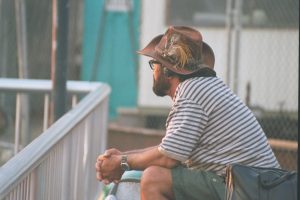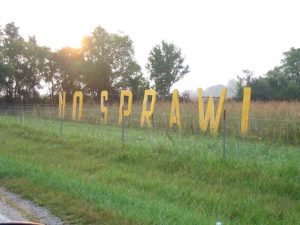The personal commitment I made late last week to boycott stores that might develop on the Hayes Arboretum land here in Richmond has gotten a bit of attention. The signatures of folks who share my commitment have been coming in steadily, with more than a hundred after just a few days. Bill Engle from the Palladium-Item called yesterday to interview me about the petition. He was friendly and understanding, but he seemed to have a hard time figuring out why I wasn't better fitting what I suspect was his profile of an "angry activist," which I'm not. Perhaps it would have been an easier story for him to write if I'd just chained myself to a tree? He did note that he was glad we weren't actually attacking the institution of Frisch's Big Boy itself...I take it he's a fan.
Continue reading "Follow up on Hayes pledge"
Category: adventures
I attended my first film festival ever this past weekend in Madison, Wisconsin. As someone who generally enjoys movies and sees the art as an important cultural phenomenon (not to mention being interested in writing and making them myself), it was a real treat to participate in an event that is shaped entirely around that phenomenon and the people who love movies.
Continue reading "Report on Madison, Wisconsin Film Festival"
I always look forward to seeing the speakers that my alma mater, Earlham College, brings to Richmond, Indiana because they often bring perspective, insight, and experience that you just can't otherwise get living in a small Midwestern town. Tonight's event was no different: William Kristol (neo-conservative pundit, editor of the Weekly Standard, Bush/Quayle advisor, and member of the American Enterprise Institute) would be giving a talk entitled "America's Foreign Policy After 9-11" on campus free to the public. I appreciate that Earlham makes the effort to bring speakers and thinkers like Kristol who are so diametrically opposed (e.g. Ann Coulter) to so many members of the Earlham community on campus to present alternate, challenging and often infuriating points of view. And I usually appreciate that the Earlham community handles these encounters in such a principled and respectful way.
Oh wait, did I just say "principled and respectful"? I must have made a horrible mistake somewhere, because at tonight's talk, about 30 minutes into Kristol's speech, a student-looking person got up on stage and smacked Kristol square in the face with a pie.
From 1962 to 1965, well before I was born, my father served in the U.S. Army. Most of his time was in Germany based at Bad Aibling Station, a military intelligence listening post, which was closed in 2002. During this time he wrote many letters and postcards to my grandparents and other family members, which they took care to preserve. In 2001, I took the time to transcribe these letters into a database and then into a navigable set of HTML documents. Despite some trepidation about making them globally public, I'm now posting these letters on my website in hopes that they will be interesting or useful to visitors here. As I mention in my editor's notes, it was pretty amazing for me to learn about my father through this medium, and to follow his adventures which, in some ways, I have mirrored.
Enjoy!
Well, as I celebrate my twenty-seventh year on spaceship Earth, I thought I should acknowledge that milestone here. Last night a friend made me write down some of the lessons/rules of life that I've learned in that time, and they seem worth recording.
- Always tell the truth and always seek the truth, no matter what.
- Heart comes before mind.
- Don't sweat the big stuff or the small stuff. The best outcome will prevail.
- Assume that people are acting out of good intentions until they show otherwise.
- Make no small plans.
- Don't be reckless with other people's lives/hearts/minds/spirits.
There ya go. Words to live by. Well...they're working okay for me, anyway.

I've just concluded my adventure of getting a seed-starting area set up at my house. It's something I've been meaning to do for a while, but I think the combination of missing the crops at Elkhorn Ranch as spring approaches, paying an arm and a leg for a few withered basil leaves at the grocery the other day, and seeing Hopi's setup inspired me into action. A few hours at my local home improvement superstore, a few hours putting up the table and equipment, and a bit of cursing later, I'm ready to get my garden going. (I have issues with instant gratification - I could have bought the equipment tonight, gone to bed at a reasonable hour, and installed it tomorrow, but no...) Now there's just that whole "not murdering the plants" part to worry about.
I have this problem with impulsiveness. On Sunday, Carrie and I were sitting in the park, soaking up some of the first real sun of the season, and we reflected on how nice it would be to grill out that night. Stating what I thought was a minor detail, I noted that we did not, in fact, possess a grill.
No problem! The Modern American Way dictates that even though it's 6 PM on a Sunday evening, one should still be able to go from soup to nuts, no grill in sight to happily grilling out, with just a few stops at your handy neighborhood megastore.
Continue reading "The Grill"
 I was actually looking forward to working late tonight. I had a client who'd asked me to do some work on a project related to some software I maintain. Because it's software I maintain outside of my usual duties at my company, I charge an hourly rate directly to the client, instead of going through Summersault. But even more than the higher pay, I was really looking forward to the particular problem space. The client sells real estate forms over the web, and maintains his order information in a database (a system I also helped to work on). He wanted me to design software that would produce a complex sales report against this database. I'd certainly done similar things before, but not ever quite anything like this, and so before I started working on it, I'd been thinking about the best approach. What data structures to use. Whether to do the sorting in the database or in the software. How to abstract the display of the data from the calculation of the data. These are the things that this 22-year-old white male thinks about on his way home from dinner on a Thursday night in Indiana.
I was actually looking forward to working late tonight. I had a client who'd asked me to do some work on a project related to some software I maintain. Because it's software I maintain outside of my usual duties at my company, I charge an hourly rate directly to the client, instead of going through Summersault. But even more than the higher pay, I was really looking forward to the particular problem space. The client sells real estate forms over the web, and maintains his order information in a database (a system I also helped to work on). He wanted me to design software that would produce a complex sales report against this database. I'd certainly done similar things before, but not ever quite anything like this, and so before I started working on it, I'd been thinking about the best approach. What data structures to use. Whether to do the sorting in the database or in the software. How to abstract the display of the data from the calculation of the data. These are the things that this 22-year-old white male thinks about on his way home from dinner on a Thursday night in Indiana.
I started around 11 PM and finished at 1:30 AM. I was alone but not lonely, the office was quiet, and I had some good techno/house music to keep me company. When I finished, I stepped back and looked at the software I'd created, proud of its design, excited about the satisfaction it might bring the client. I gathered my things with energy in anticipation of a good night's sleep.
As I turned out the lights and locked the door behind me, I noticed how hard it was raining and flipped up my hood. I didn't see the man in the black leather jacket coming around the corner right in front of me, and he gave me a bit of a jump. His hands were tucked in his pockets, his hair and face soaked to the point where he could barely see, and he was stumbling down the sidewalk not seeming to seek out any of the shelter that was available in the alcoves of the office entrances (including the entrance to mine). I had seen many other folks like him, wandering down the same street at the same time of night, some of them looking more dangerous and mean than others, all of them feeling quite distant from the world of databases and programming and websites from which I had just emerged.
 I thought how sad it was that this guy was getting so completely soaked with no apparent end in sight. Maybe he was mentally handicapped and didn't know where to go? Maybe he was drunk and didn't know where he was? Maybe he was homeless and didn't really care if he made it to or from anywhere at all. With these thoughts in my mind, I got into my car, turned on the wipers and the heat and the radio and the engine and the lights, and started for home.
I thought how sad it was that this guy was getting so completely soaked with no apparent end in sight. Maybe he was mentally handicapped and didn't know where to go? Maybe he was drunk and didn't know where he was? Maybe he was homeless and didn't really care if he made it to or from anywhere at all. With these thoughts in my mind, I got into my car, turned on the wipers and the heat and the radio and the engine and the lights, and started for home.
But when I came to the end of the block of our office, the man was alongside the car, and waved in at me. He came around to the front of the car and shouted something that I couldn't hear. I powered down my window cautiously, and heard him mumble something about "going to 12th street".
And this is the thought process we go through: His hands were in his tight jean pockets, probably nothing too harmless there. His jacket was bulky but probably didn't contain anything that could be used for beating me too severely - at least if he had a gun, he'd shoot me quickly and be done with it. I wasn't carrying anything with me that would turn my existence into a meaningless void were it to be stolen or damaged. He was stumbling around and looked off balance. I could take him. (I could take him on.) It was raining like hell.
"Get in!" I opened the door and he landed in the passenger seat. "Oh, my god, thank you."
We drove through a run-down part of town that I wasn't too familiar with, and headed out into an even less-familiar residential area that was actually just an industrial area with some homes and trailers scattered around it as a convenience to its workers. It was dark and there was no one around. His name was Herb, and he told me that he had been on his way to try to call his son, and then I saw that he did have something in his hand - two quarters. He said "I gotta pay you for this" and I told him that he didn't. When he insisted further (even nice, nonviolent people can be mean when you don't let them compensate you properly), I told him the quarter he was going to use to call his son would be sufficient. He gave me both quarters, muttering that it wasn't enough, and I put them in my car change drawer where I will probably withdraw them again in the future to cover the cost of an overpriced fast food item.
 Confirming my suspicions that he was slightly drunk, he threw out a couple of names and asked me if I knew the guys, telling me that they'd all graduated together. He asked in a manner suggesting that because of this good deed I had done for him, I should know these men that he held in some sort of high regard. I was a little nervous but touched. As he made to leave, I said something stupid like "maybe we'll run across each other again some day and you can do the same for me." He said I was an incredible fellow. And then, after Herb had gotten out of the car, he turned around and looked at me, rain once again drenching his face and jacket, and said "You know what, though, this isn't anything like Vietnam. There, this stuff went on for forty days and more." With that, he tightened his jacket around his chest, closed the door, and walked off towards the house. These are the things a 50-something working-class white male thinks about on his way home from a bar on a rainy night in Indiana.
Confirming my suspicions that he was slightly drunk, he threw out a couple of names and asked me if I knew the guys, telling me that they'd all graduated together. He asked in a manner suggesting that because of this good deed I had done for him, I should know these men that he held in some sort of high regard. I was a little nervous but touched. As he made to leave, I said something stupid like "maybe we'll run across each other again some day and you can do the same for me." He said I was an incredible fellow. And then, after Herb had gotten out of the car, he turned around and looked at me, rain once again drenching his face and jacket, and said "You know what, though, this isn't anything like Vietnam. There, this stuff went on for forty days and more." With that, he tightened his jacket around his chest, closed the door, and walked off towards the house. These are the things a 50-something working-class white male thinks about on his way home from a bar on a rainy night in Indiana.
I drove away quickly, still fighting off wondering "am I safe?" as I headed to known parts of town. I couldn't have NOT picked Herb up from out of the pouring rain unless he displayed some outward sign of intentions to harm me. But beyond that, I'm *glad* I did it. The personal security I gave up was well worth some crystal clear perspective granted to me by the contrast that Herb provided tonight.
The boy, trying to ignore the reoccurring dull pain in his left side, brought his hands together in front of his face, and held them there, barely touching. He moved his index fingers together and smiled at the brief moment before they touched, when each seemed to gently reach out to the other, attracting and pulling and melting into the moment of contact.
The girl, several hundred miles away and an hour from the nearest hospital, dropped her shovel and fell back into the sand screaming in terror from the pressure in her skull. Even when mommy scooped her up and held her tight and told her it would be okay, she could not stop screaming. She cried because it hurt and she did not understand.
![]()
The old woman ran her fingers over the smooth cover of the book on her bedside table, comforted at its presence though she could not see its pages. She had always had books near her, as a mother, as a teacher, and as a grandmother, and now she wanted to have one ready to read as soon as she got her strength back. She sighed at hearing the birds outside her window eating from the feeder down below, wishing she could see them, imagining that she did. She wondered if any of the friends or family who had come to say goodbye would remember to fill it again.
The old man nodded his head slowly as he was led past his wife's casket. He briefly ran his fingers over its (almost inappropriately) shiny wood surface, not so long as to acknowledge fully this loss, but just long enough to say "I know you don't belong in there." After sixty-five years together in a world such as this, it did not seem possible that he was breathing while she was not. He thought about how much work there was to do, and how he just wanted to take a nap, wondering if she would be there when he awoke.
![]()
The boy glanced up only briefly at his mother, but then back to the dashboard, and then out the windshield to the car in front of them. Briefly, the flashing of the other car's turn signal again came in sync with the clicking noise coming from their own, but then quickly went off into its own cycle. Why not make all car turn signals click with the same rhythm? He giggled quietly at the (somehow unsatisfying) answer to his question as he pictured a great, unified clicking noise on all the streets of all the world. Then, the car turned and it was quiet again.
The girl thought about her father's answer to her question as they kept walking: "Because he is a bad man, and he doesn't deserve it." He hadn't looked like a bad man. He had startled them a bit and he looked kind of dirty, but mostly he looked tired and hungry, sitting in that doorway covered in his blankets and newspapers. The girl could not know about the "bad" man's lung cancer, or that he could only sleep in that doorway because it was Sunday, or that she would be startled by quite a few more like him in her lifetime. But she quietly decided that she would have given him some money, if she had any. So what if he didn't deserve it?
![]()
The man tried to look deeply into his wife's sad and cautious eyes, but with every word he spoke he realized more that the depth he sought would have to be recreated rather than rediscovered. The horror would never quite leave him, that he had somehow justified a few moments of unworthy pleasure for this numbing pain he had brought into their marriage. As he looked at the woman he loved - perhaps more so than he loved himself? - he promised that, if she could forgive him, he would learn how to love all over again.
The woman laughed beautifully and fully as she tried to cover her husband in the leaves they had gathered, ignoring the itching against her skin and the damp cold on her fingers. They tossed each other around gently and finally lay side by side in the messy pile they had created. They drew close as she wrapped her arm around his chest and he put his hand in the small of her back. She looked intently up at the rounded space of his neck, wondering if she could curl up in that space and go to sleep. She had told him that she forgave him many times, and they had oddly never stopped saying "I love you." But it was only now that she fully appreciated the intensity and depth of the love with which they had covered each other, the forgiveness and pain inherent in it, and the contentment of knowing that it would survive and shape them forever.
![]()
With the noise of the reception now off in the distance, the man and the woman, the boy and the girl, stood facing each other, hands raised and each with palms nervously but firmly pressed against the other's. It was a perfect darkness and the temperature let them forget about their skin and their balance and their mass. They looked deeply, smiling at the joy of this night and of these several years together. Each wondered how they met, how this moment came to be, and each looked for signs about what it would mean to spend the rest of their lives together. As their faces neared, each seemed to gently reach out to the other, attracting and pulling and melting into the moment of contact. Moments before the physical touch, another kind of touch that explains everything engulfed them both.

